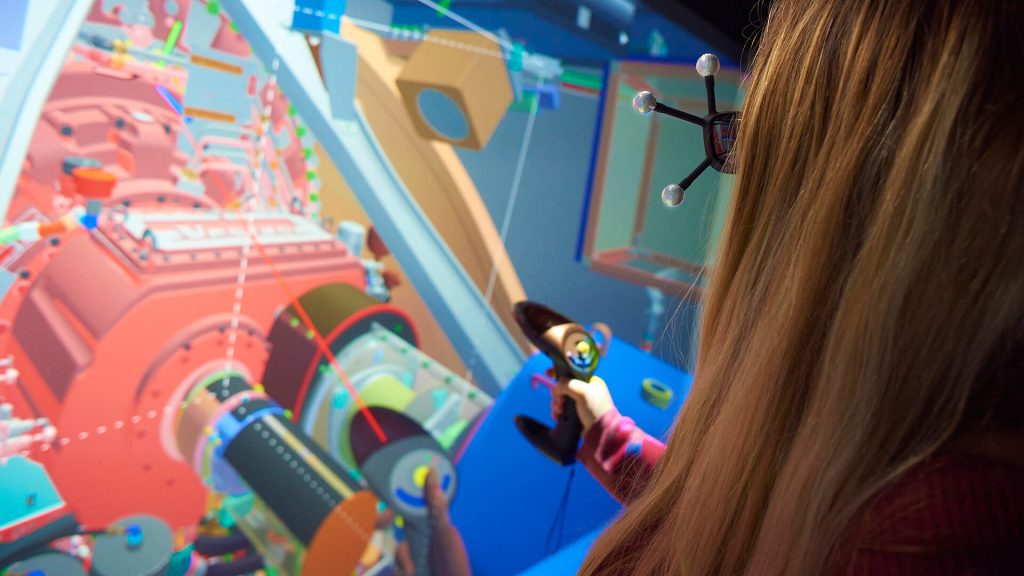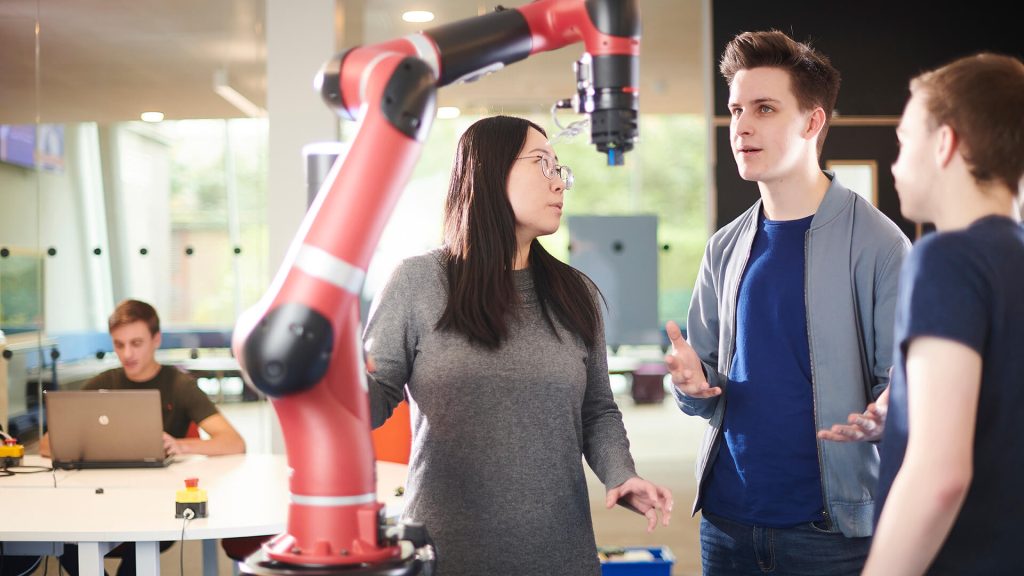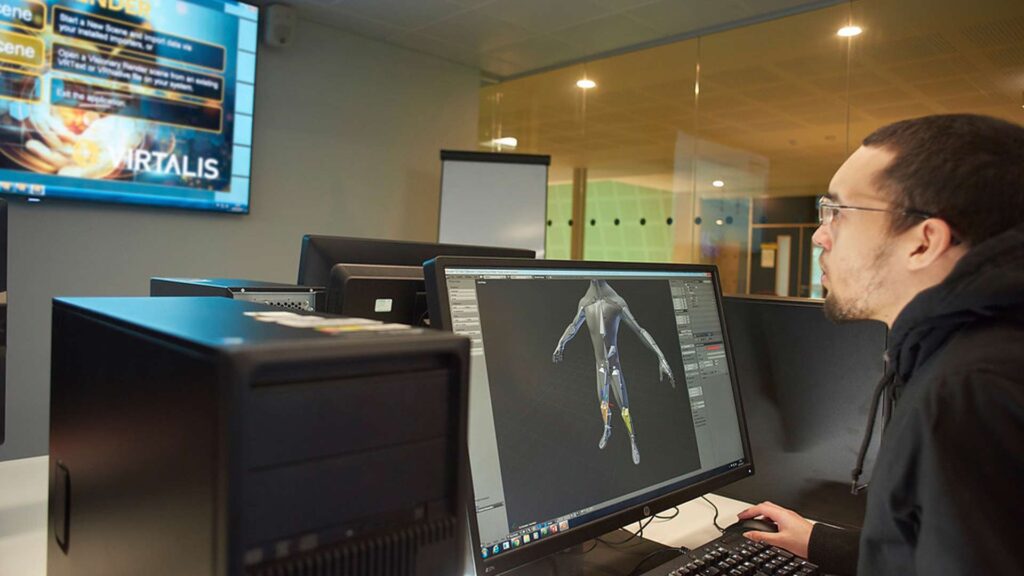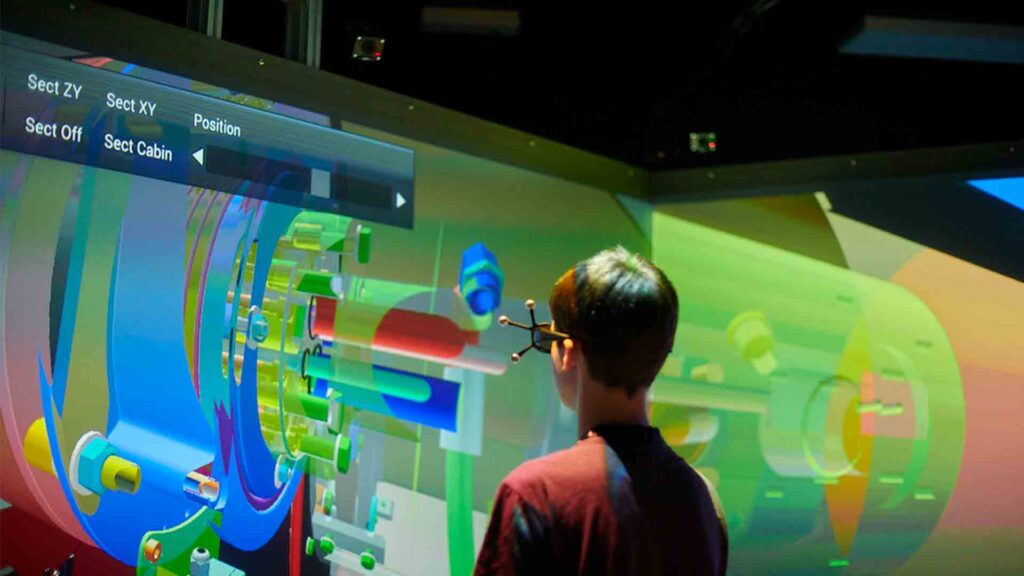Robotics & Artificial Intelligence BSc (Hons)
UCAS code: GH76
Intelligent systems are having a huge impact. Household appliances are more helpful and robots are venturing into space. Help create the future of AI on a robotics degree awarded initial accreditation by BCS, The Chartered Institute for IT.
Overview
| Course length: | 3 years full-time Typically 4.5 years part-time |
|---|---|
| Start dates: | September 2025 September 2026 |
| Location: | Edge Hill University |
| Example offers: | BBC-BBB (A Level) or DMM (BTEC) View full entry criteria |
| Subject(s): | Computer Science |
| Faculty: | Arts and Sciences |
| Department: | Computer Science |
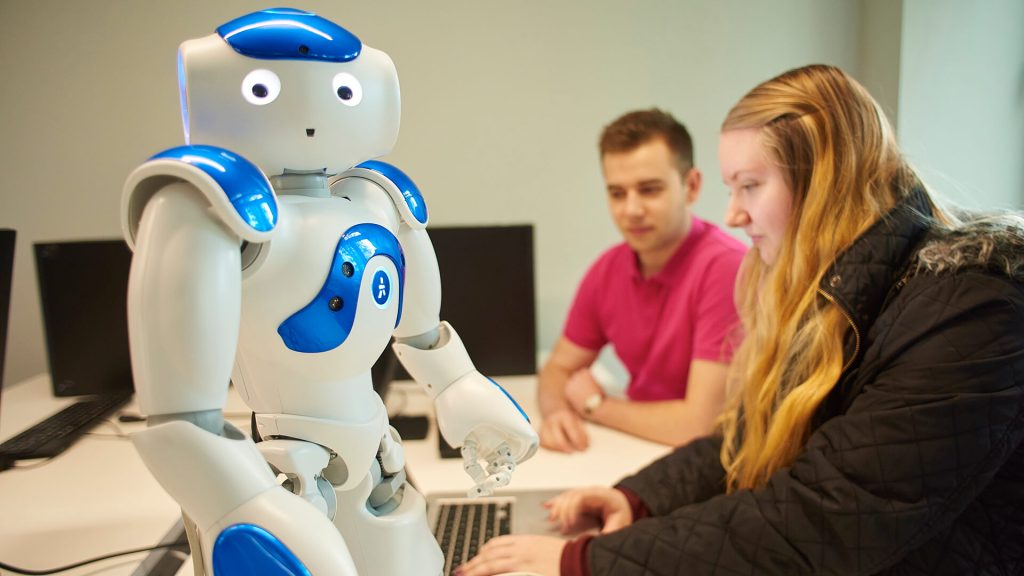
Robotics and AI have come a long way since the work of Alan Turing. They pave the way for extraordinary opportunities in the modern world. As we develop increasingly sophisticated artificial systems, we’ll see transformations in how we live, work, travel and learn. After graduating with our BSc (Hons) Robotics & Artificial Intelligence degree you could be working on the newest emerging technologies in a vast range of industries.
During our robotics and artificial intelligence course, we’ll teach you how to unleash the potential of robotics, AI, automation and more. Could you make a difference to the way virtual reality is used in medicine? Do you want to test the boundaries between human intelligence and machine intelligence?
On our robotics and AI and robotics degree, you’ll develop specialist expertise in the fundamentals of intelligent systems. Programming, network architecture and software design will all become second nature to you.
After graduation with your BSc (Hons) degree, you’ll be prepared for a career working with intelligent systems ranging from domestic appliances and search engines to robots exploring Mars.
An accredited degree
This course is accredited by BCS, The Chartered Institute for IT, for the purposes of fully meeting the academic requirement for registration as a Chartered IT Professional. Successfully completing an accredited honours degree is the first step to full BCS membership and to being awarded chartered status.
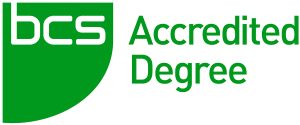 BCS, The Chartered Institute for IT
BCS, The Chartered Institute for IT
Course features
-
International students can apply
-
Professional accreditation
-
Sandwich year option available
-
Studying abroad option available
-
Work placement opportunity
What you'll study
The first year of your BSc (Hons) Robotics & Artificial Intelligence degree will be a balance of computing and fundamental mathematics. You’ll develop the fundamentals of analysis, programming and computer architecture, while developing your skills in calculus to give you the fundamental skills you need for the rest of your robotics degree. There will also be an introduction to problem-solving applications including graph theory. Finally, we’ll give you an introduction to potential career options to help you select your path for Years 2 and 3.
During Year 2 of the robotics and AI degree, we’ll delve into further detail on operating systems, algorithms, data structures and robotics. You’ll learn about the theory and techniques in different artificial intelligence approaches and explore the aspects of data analysis and its implications on intelligence systems. We’ll give you more information on improving your employability and the skills you’ll need in the workplace. At the end of Year 2 you’ll have the option of taking a 12-month industrial placement.
In your final year, you’ll master autonomous robotic systems and artificial intelligence. We’ll show you the latest developments in this exciting emerging area and establish how you can make your mark in the world of robotics and AI. You might choose to conduct in-depth analysis into Smart Devices computing, adaptive intelligence, robotic systems, VR, or games and computer simulation for your final project. Build your practical experience and confidence before graduating to your chosen career with your BSc (Hons) Robotics & Artificial Intelligence degree.
How you'll study
The robotics and AI programme is delivered through a combination of lectures, student-led seminars, workshops, group tutorials, practicals and technology enhanced learning. Classes are highly interactive, with the practical application of concepts a key factor, including cases drawn from real-life.
You will also have the opportunity to develop your employability profile through a work placement.
How you'll be assessed
A variety of assessment methods will be used on this degree including formal examinations, lab practicals and project reports.
Throughout the programme, you will also be assessed using coursework, worksheets, in-module tests, example sheets, problem-solving exercises and presentations.
Who will be teaching you
You will be taught by staff who are passionate about student learning and development. The programme team are specialists in computing and active researchers in areas including artificial intelligence, machine learning, intelligent systems, mobile computing and distributed systems. Academic staff are regular contributors to conferences and journals, engaging with the wider business and academic environment in disseminating knowledge and delivering impact.
Entry criteria
Entry requirements (2025 / 2026)
Typical offer 112-120 UCAS Tariff points, for which no specific subjects are required, plus GCSE Mathematics at Grade C or Grade 4 or above (or equivalent).
Please note, for all programmes in the Department of Computer Science, a level 2 numeracy qualification is not considered as equivalent to GCSE Grade C or Grade 4 in Mathematics.
Example offers
| Qualification | Requirement |
|---|---|
| A Level | BBC-BBB. |
| BTEC Extended Diploma (or combination of BTEC QCF qualifications) | Distinction, Merit, Merit (DMM). |
| T Level | Overall grade of Merit. |
| International Baccalaureate (IB) | We are happy to accept IB qualifications which achieve the required number of UCAS Tariff points. |
| Access to Higher Education Diploma | 45 credits at Level 3, for example 15 credits at Distinction and 30 credits at Merit or 24 credits at Distinction and 21 credits at Merit. The required total can be attained from various credit combinations. |
Please note, the above examples may differ from actual offers made. A combination of A Level and BTEC awards may also be accepted.
If you have a minimum of two A Levels (or equivalent), there is no maximum number of qualifications that we will accept UCAS points from. This includes additional qualifications such as Extended Project Qualification (EPQ), AS Levels that haven't been continued to A Level, and General Studies AS or A Level awards.
English language requirements
International students require IELTS 6.0, with a score no lower than 5.5 in each individual component, or an equivalent English language qualification.
If your current level of English is half a band, one band, or one-and-a-half bands lower, either overall or in one or two elements, you may want to consider our Pre-Sessional English course.
How to apply
Apply full-time
Read our guide to applying through UCAS to find out more about the application process.
International
Please see our international student pages for further information about how to apply as a prospective international student.
Part-time applications require a direct application to Edge Hill. Please select the year of entry that you wish to apply for.
Should you accept an offer of a place to study with us and formally enrol as a student, you will be subject to the provisions of the regulations, rules, codes, conditions and policies which apply to our students. These are available at www.edgehill.ac.uk/studentterms.
If you join a full time undergraduate degree at Edge Hill University, we will guarantee you the offer of a room in our halls of residence for the first year of your course.
Discover our accommodation
Facilities
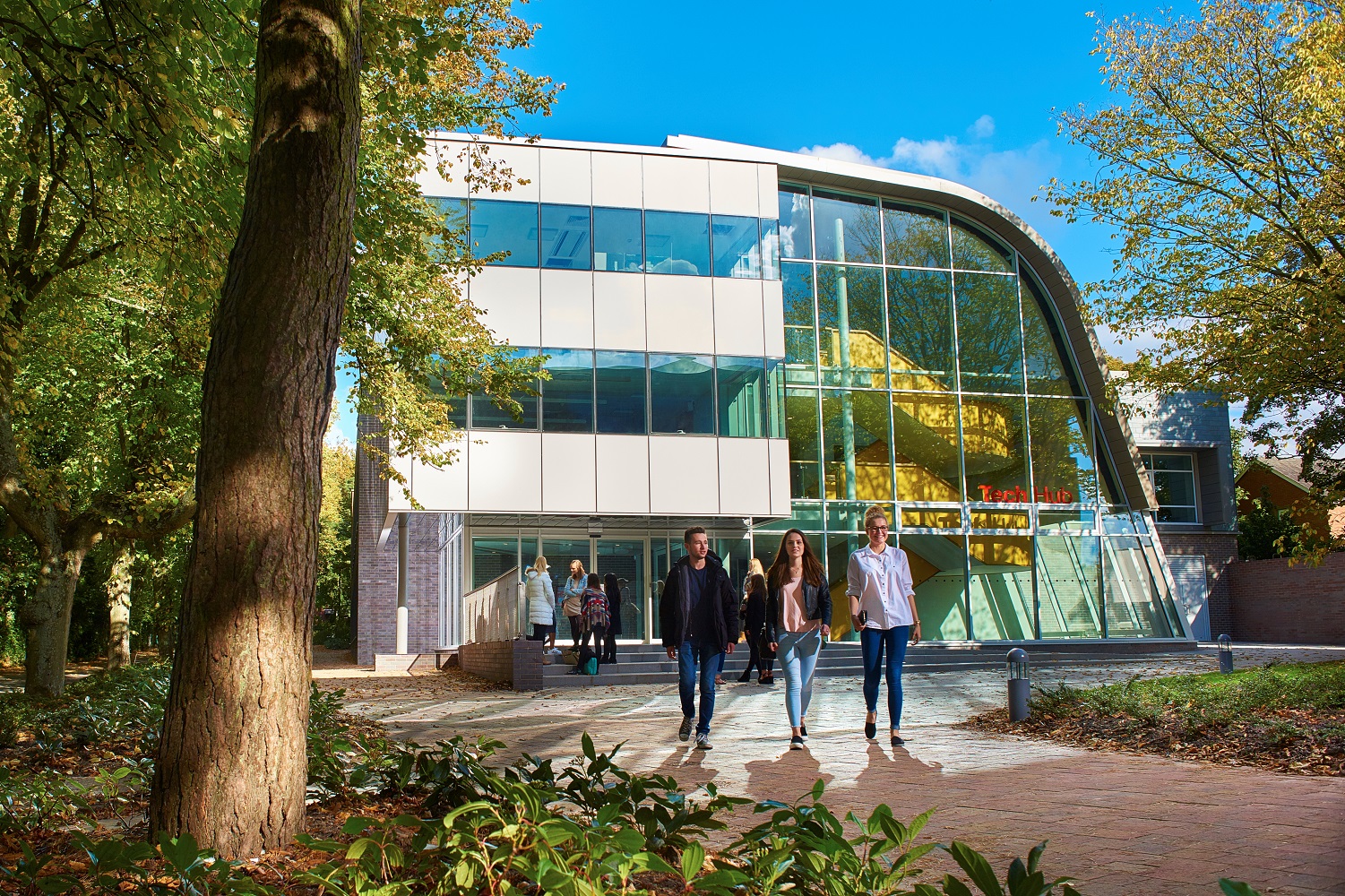 The robotics and AI degree is part of the Department of Computer Science, based in the state-of-the-art, £13m Tech Hub. This purpose-built development offers highly contemporary suites of outstanding facilities for computer science and engineering students – including students of the BSc (Hons) Robotics & Artificial Intelligence degree . Our modern computing and engineering laboratories are equipped with comprehensive test and measurement equipment, high-specification computers, high-resolution screens and the latest hardware and software.
The robotics and AI degree is part of the Department of Computer Science, based in the state-of-the-art, £13m Tech Hub. This purpose-built development offers highly contemporary suites of outstanding facilities for computer science and engineering students – including students of the BSc (Hons) Robotics & Artificial Intelligence degree . Our modern computing and engineering laboratories are equipped with comprehensive test and measurement equipment, high-specification computers, high-resolution screens and the latest hardware and software.
A four-screen CAVE (Computer Augmented Virtual Environment) provides a super immersive 3D virtual environment, enabling users to immerse themselves in a virtual room and experience real life scenarios in 4K resolution. There are also specialist laboratories for networking and games programming, in addition to a specialist research laboratory, open access laboratory and a Harvard style lecture theatre.
Where you'll study
Learning resources
Learning resources include robots and a robotics simulator, wired and wireless networking hardware, graphics software, web development tools, software development environments, big data servers, eye trackers, giant 3D interactive teaching screens, and other specialist software required for studying forensics and internet security techniques.
Finance
Tuition fees
UK Full-Time
£9,535
a year
UK Part-Time
£79 per credit
for 360 credits
International
£17,000
a year
EU/EEA and Swiss students who have settled or pre-settled status under the EU Settlement Scheme, as well as Irish nationals, may be eligible for the UK tuition fee rate.
Financial support
Subject to eligibility, UK students joining this course can apply for a Tuition Fee Loan from the Government to cover the full cost of tuition fees. UK students enrolling on the course may also be eligible to apply for additional funding to help with living costs.
Scholarships
We offer a range of scholarships, which celebrate the determination, commitment and achievement of our students. Many of our scholarships are awarded automatically. There are some however, where you will need to be involved in an application or nomination process. To find out more about our scholarships and check your eligibility, please visit our dedicated scholarships pages.
Money Matters
Please view the relevant Money Matters guide for comprehensive information about the financial support available to eligible UK students.
EU/EEA and Swiss students who have settled or pre-settled status under the EU Settlement Scheme may be eligible to apply for financial support. Irish nationals can ordinarily apply to Student Universal Support Ireland (SUSI). If you are an EU student who does not have settled or pre-settled status, or are an international student from a non-EU country, please see our international student finance pages.
Your future career
The robotics and intelligent systems industry is already well established, but the potential to grow is enormous. As technology moves forward, our graduates will be working on innovative solutions to problems we face today and in the future.
Equipped with the know-how needed to build your career, you could be working on anything from domestic and entertainment robots, to those in agriculture, supply chain management, medical, or even in space, land or sea.
Potential job roles that are well suited to graduates of our robotics and AI degree include Robotic Engineer, Machine Learning Engineer, Research and Design Engineer, Business Intelligence Developer, and Computer Engineer. And no matter what field you choose to start your career in, you’ll be equipped with sought after transferable skills like problem solving, statistical analysis, and data visualisation.
Course changes
Every effort has been made to ensure the accuracy of this information, however our courses are subject to ongoing review and development. Changing circumstances may necessitate alteration to, or the cancellation of, courses.
Changes may be necessary to comply with the requirements of professional bodies, revisions to subject benchmarks statements, to keep courses updated and contemporary, or as a result of student feedback. We reserve the right to make variations if we consider such action to be necessary or in the best interests of students.
